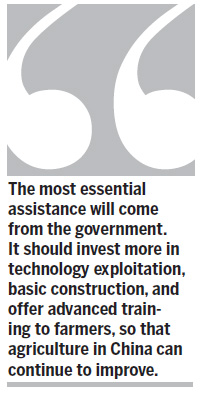View
Positive policies key to harvests
By Ke Bingsheng (China Daily)
Updated: 2010-12-21 08:05
 |
Large Medium Small |

Encouraging farmers and raising productivity has resulted in seven years of grain increases but challenges still lie ahead
A good harvest is a prerequisite of prosperity. For the past seven years, grain production in China has been continually increasing, offering immense support to social development.
Without doubt, there are many causes for the good harvest: favorable climate conditions, advancing technology, etc. But the most important of them all has been government policies.
Beginning in 2003, the government issued a series of documents on agricultural problems. Since then many related policies have been made to support agricultural development as well as the rural economy.
The agricultural tax, which had a history of almost 2,600 years in China, was scrapped in 2006, while increased agricultural investment and allowances were introduced to encourage people to grow crops. At the same time, protective prices were set on grains, so that farmers would not be hurt by the falling prices. The government even offered consultant service to introduce advanced technologies.
These measures have been effective in two ways, by encouraging farmers to continue farming and raising productivity.
The increase in grain lands is silent testimony to the growing enthusiasm of farmers. From 2003 to 2009, through such measures as raising the multiple crop index and structural adjustment, grain lands in China have increased by 9.3 million hectares, almost 10 percent of the total.
Productivity was increased mainly through modernization. Thanks to immense investment on basic construction, the process was greatly accelerated during this period, and productivity raised.
The introduction of modern technology has also assisted in structural adjustments by expanding the production of some high-yielding crops. During that period, the land for corn has risen by 30 percent, while that for rice has risen 12 percent, both making great contributions to the harvest. By structural adjustments, the farmers are making better use of the arable land, as well as getting a better income.
We should not forget such achievements were derived amid great difficulties. With the accelerating process of urbanization, arable land in China has always been in decline, and the trend will continue in the future. That's a severe challenge to agriculture.
At the same time, the cost of agricultural production has also risen, in both materials and labor force. To make it worse, China was also struck by several natural disasters in the period, which caused huge loss of life and wealth.
However, all these challenges were met with effective measures. The central government set a bottom line of 120 million hectares of arable lands to ensure enough food for the people, while offering agricultural incentives to raise the farmer's income. It also took effective measures to combat the natural disasters.
But while China's agricultural achievement has been praiseworthy, there are still serious challenges to be faced in the future.
With the accelerating process of urbanization, the decline in arable lands is irreversible. More and more land will be used to construct railways and apartments.
The scarcity of water resources is also becoming increasingly evident, especially in the northern regions, where underground water is declining.
Besides, production costs, especially the cost of labor, is continuing to rise. One giant problem we face in the future will be how to stimulate farmers to grow crops, which will not bring much profit. It is also difficult to further raise productivity.
As a result, China has already become a net importer of agricultural products. In 2009 alone, China imported 42.5 million tons of beans, more than half of the world's total and three times its domestic production. It would need 23 million hectares of arable land, or 15 percent of the country's whole, to produce these beans.
Bean imports were still rising in the first three seasons this year, as were imports of cotton and edible oil. These tell us the pressure China faces to meet the domestic demand for agricultural products.
To cope with these problems, the most essential assistance will come from the government. It should invest more in technology exploitation, basic construction, and offer advanced training to farmers, so that agriculture in China can continue to improve.
Thanks to government policies, agriculture in China has achieved success in the past seven years, despite the difficulties and challenges. The key to future agricultural development lies in more such measures. The government should step forward in offering incentives to the farmers, so that farming will be a desirable profession.
The author is president of China Agricultural University.